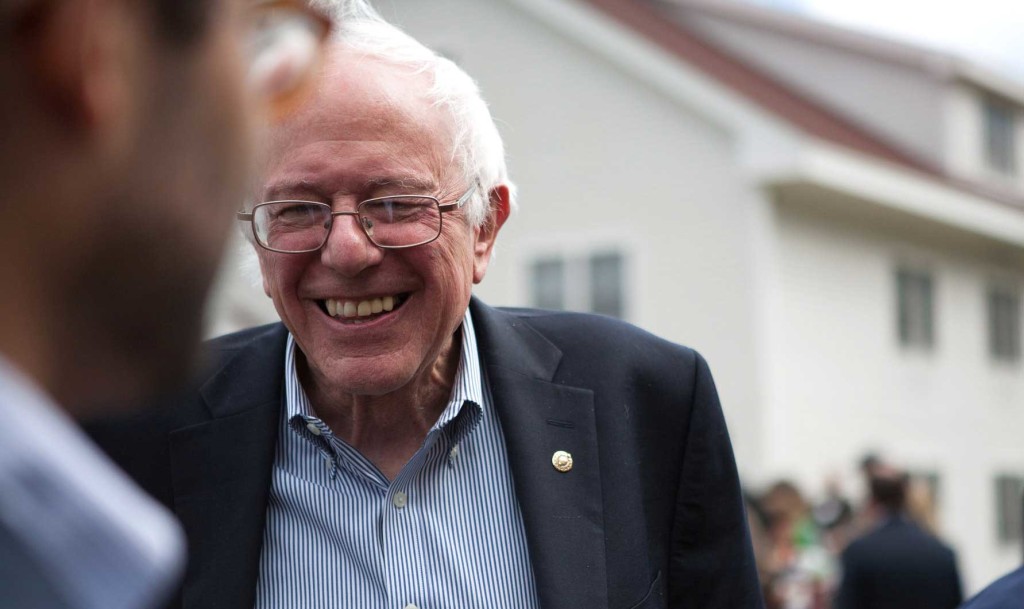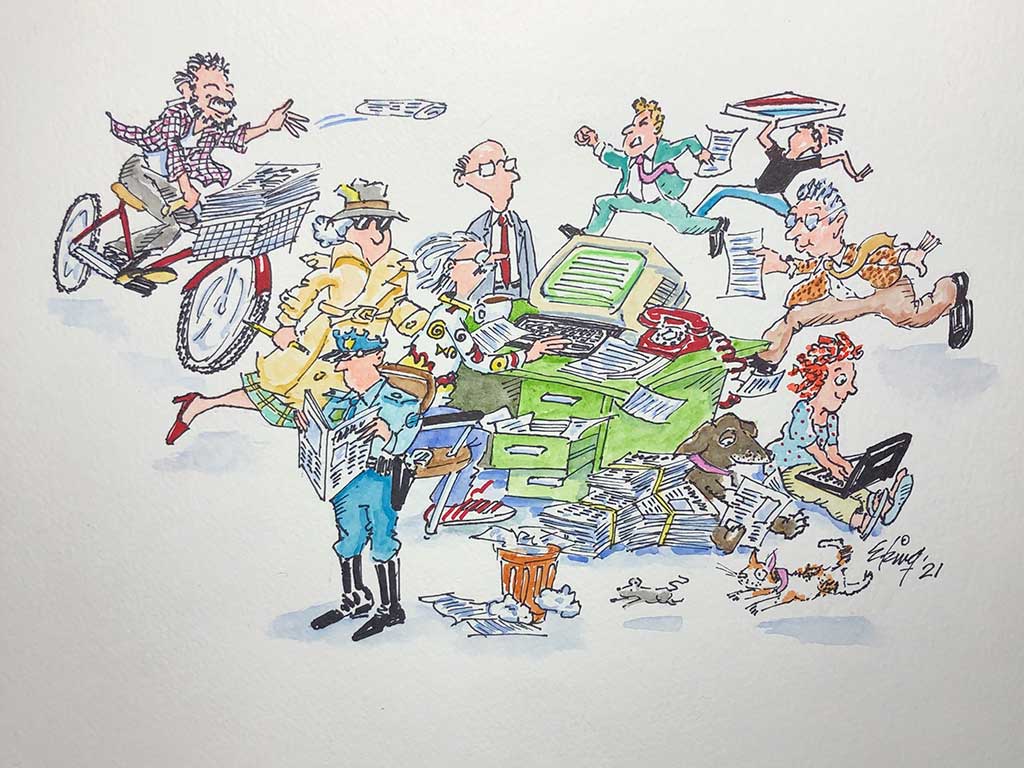Bernie’s Big Comedown: An Independent Run Is Unlikely
by Adam Marletta

I have read, with no small amount of amusement, the various calls for Bernie Sanders to continue his presidential campaign as an independent candidate, given that rival Hillary Clinton has all but secured the nomination at this point. Many leftists, myself included, have spent the last year lamenting Sen. Sanders’ decision to run in the corporatist Democratic Party–once described by Kevin Phillips, a former political strategist for Richard Nixon, as “history’s second most enthusiastic capitalist party.”
But the response from “Sandernistas,” to the idea that Sanders run as anything but a Democrat has been swift, vicious, and often condescending. “Shut up! He had no choice but to run as a Democrat!” Sanders’ fervent followers insist. “Screw you! He would have had no chance as an independent! The media would have ignored him! Stop making personal attacks on Bernie!”
(Don’t you love how we’re all suddenly on a first-name basis with our presidential candidates…?)
Given voters’ years-long disenchantment with both parties — the Republicans and the Democrats — this claim hardly seems valid. I can easily envision a third-party challenge by Sanders drawing the same droves — perhaps even more — of enthusiastic supporters, much like Ralph Nader’s “super rallies” did during the 2000 election.
As for the second claim, Sanders was still marginalized by the mainstream corporate news networks. According to one study, nightly news programs on NBC, ABC, CBS, and Fox News devoted 234 minutes to reporting on Donald Trump in 2015 alone, versus just ten minutes total to Sanders.
Seems to me, if your “political revolution” is guaranteed not to be televised, you may as well embark on one that poses a genuine threat to the political establishment–in other words, an actual revolution.
And therein lies the great contradiction of Sanders’ presidential campaign. The truth is, Sanders cares more about maintaining his own access to power and privilege than fighting for justice and truth–let alone, sparking a genuine working class uprising.
Indeed, when Chris Hedges and Seattle City Councilor Kshama Sawant confronted Sanders during the 2014 “People’s Climate March” about his decision to run as a Democrat, despite serving his entire political career as a (mostly nominal) independent, his answer was frank: “I don’t want to end up like Ralph Nader.” That is to say, Sanders — who fully subscribes to the bogus “spoiler” effect Democrats attribute to third-party candidates — does not want to lose his seniority status in the Senate or his committee chairmanships.
Were Sanders to run as an independent, Hedges wrote earlier this year, the Democratic “party machine will turn him, as it did Nader, into a pariah. It will push him outside the political establishment. Sanders probably saw his answer as a practical response to political reality. But it was also an admission of cowardice. Nader paid a heavy price for his courage and his honesty, but he was not a failure.”
As it is, the calls for Sanders to continue his campaign through the general election as an independent are likely to go unheeded. Sanders has long been a vocal opponent of third-party presidential candidates. In 2004, Sanders not only campaigned for the hawkish John Kerry, he informed voters in Vermont, “Not only am I going to vote for John Kerry. I am going to run around this country and do everything I can to dissuade people from voting for Ralph Nader… I am going to do everything I can, while I have differences with John Kerry, to make sure that he is elected.”
Sorry folks, but Sanders made his bed with the Democrats long ago.
While Sanders’ followers insist the election is “not over, yet!” and that they anticipate a brokered convention in the summer, the reality is Sanders’ campaign is, for all intents and purposes, over. It is now mathematically impossible for him to surpass Clinton in the delegate count. And this is to say nothing of the so-called “superdelegates,” most of whom have already committed to supporting Clinton. Sanders has already begun laying off campaign staffers. As CounterPunch’s Paul Street observes, Sanders is now focusing on “going to the Democratic National Convention to fight over the party’s platform, not over its presidential nomination.”
(Party platforms, incidentally, are a complete farce. What the Democrats espouse in their irrelevant, non-binding platform, and the policies they actually pursue are two entirely different things.)
In a matter of months, Sanders will inevitably throw his support behind Clinton, and instruct his hundreds of ardent supporters to do the same. In doing so, Sanders will fulfill his sheepdog role and herd his hundreds of passionate, mostly young supporters back into the dead-end that is the Democratic Party–the graveyard of social movements. It is a tired song-and-dance routine–one that many of us saw coming miles away, yet were savagely berated and denounced by the liberal true-believers for daring to speak the truth of.
Look, I get that nobody likes a killjoy, and I am aware of the perils of what Lenin termed “ultra-leftism.” And it has been encouraging — at times even exciting — to see the throngs of people cramming into stadiums to hear Sanders champion universal health care, free college education, and breaking up the “Too Big To Fail” Wall Street banks.
Indeed, if Sanders has succeeded at anything, it is in making the word “socialism” once again safe for mainstream political discourse. (This feat is made all the more notable given the fact that Sanders is not really a socialist at all. He is a New Deal Democrat.)
But if we are serious about launching the political revolution Sanders speaks of, we must understand the capitalist, anti-worker Democratic Party for what it is. I, for one, am sick to death of watching the left continue, time and time again, to throw its efforts into a Democratic Party that cares nothing for it. As Hedges writes in his column,
No movement or political revolution will ever be built within the confines of the Democratic Party. And the repeated failure of the American left to grasp the duplicitous game being played by the political elites has effectively neutered it as a political force. History, after all, should count for something.
We need to finally and irrefutably abandon the Democrats once and for all and build a true political party for the working class. This work will not be easy. It will be long, difficult, and rife with the internal conflicts that seem endemic among activists. But it is work that we must begin if we are to ever emancipate ourselves from capitalist rule.
Finally, while readers seem to react negatively whenever I mention the Green Party’s Jill Stein … well, she is going to be on the Maine ballot in November… No need for a write-in campaign for Stein. And she supports many of the same domestic platforms as Sanders, in addition to a considerably more humane foreign policy approach. Will she win the presidency? Highly unlikely. But Stein’s campaign is more about creating a grassroots, worker-driven movement for, in her alliterative phrasing, “people, planet, and peace over profit.”
Again, if Sanders’ enthusiastic supporters are truly serious about revolution, they may want to start looking over Stein’s platform and give serious consideration to breaking away from the Democrats and “lesser evilism” this year.
All questions of political strategy aside, Sanders has done a formidable job of raising the level of class consciousness. Now it is up to us to build on what he has started.






Bernie’s Big Comedown
Bernie’s Big Comedown: An Independent Run Is Unlikely
by Adam Marletta
I have read, with no small amount of amusement, the various calls for Bernie Sanders to continue his presidential campaign as an independent candidate, given that rival Hillary Clinton has all but secured the nomination at this point. Many leftists, myself included, have spent the last year lamenting Sen. Sanders’ decision to run in the corporatist Democratic Party–once described by Kevin Phillips, a former political strategist for Richard Nixon, as “history’s second most enthusiastic capitalist party.”
But the response from “Sandernistas,” to the idea that Sanders run as anything but a Democrat has been swift, vicious, and often condescending. “Shut up! He had no choice but to run as a Democrat!” Sanders’ fervent followers insist. “Screw you! He would have had no chance as an independent! The media would have ignored him! Stop making personal attacks on Bernie!”
(Don’t you love how we’re all suddenly on a first-name basis with our presidential candidates…?)
Given voters’ years-long disenchantment with both parties — the Republicans and the Democrats — this claim hardly seems valid. I can easily envision a third-party challenge by Sanders drawing the same droves — perhaps even more — of enthusiastic supporters, much like Ralph Nader’s “super rallies” did during the 2000 election.
As for the second claim, Sanders was still marginalized by the mainstream corporate news networks. According to one study, nightly news programs on NBC, ABC, CBS, and Fox News devoted 234 minutes to reporting on Donald Trump in 2015 alone, versus just ten minutes total to Sanders.
Seems to me, if your “political revolution” is guaranteed not to be televised, you may as well embark on one that poses a genuine threat to the political establishment–in other words, an actual revolution.
And therein lies the great contradiction of Sanders’ presidential campaign. The truth is, Sanders cares more about maintaining his own access to power and privilege than fighting for justice and truth–let alone, sparking a genuine working class uprising.
Indeed, when Chris Hedges and Seattle City Councilor Kshama Sawant confronted Sanders during the 2014 “People’s Climate March” about his decision to run as a Democrat, despite serving his entire political career as a (mostly nominal) independent, his answer was frank: “I don’t want to end up like Ralph Nader.” That is to say, Sanders — who fully subscribes to the bogus “spoiler” effect Democrats attribute to third-party candidates — does not want to lose his seniority status in the Senate or his committee chairmanships.
Were Sanders to run as an independent, Hedges wrote earlier this year, the Democratic “party machine will turn him, as it did Nader, into a pariah. It will push him outside the political establishment. Sanders probably saw his answer as a practical response to political reality. But it was also an admission of cowardice. Nader paid a heavy price for his courage and his honesty, but he was not a failure.”
As it is, the calls for Sanders to continue his campaign through the general election as an independent are likely to go unheeded. Sanders has long been a vocal opponent of third-party presidential candidates. In 2004, Sanders not only campaigned for the hawkish John Kerry, he informed voters in Vermont, “Not only am I going to vote for John Kerry. I am going to run around this country and do everything I can to dissuade people from voting for Ralph Nader… I am going to do everything I can, while I have differences with John Kerry, to make sure that he is elected.”
Sorry folks, but Sanders made his bed with the Democrats long ago.
While Sanders’ followers insist the election is “not over, yet!” and that they anticipate a brokered convention in the summer, the reality is Sanders’ campaign is, for all intents and purposes, over. It is now mathematically impossible for him to surpass Clinton in the delegate count. And this is to say nothing of the so-called “superdelegates,” most of whom have already committed to supporting Clinton. Sanders has already begun laying off campaign staffers. As CounterPunch’s Paul Street observes, Sanders is now focusing on “going to the Democratic National Convention to fight over the party’s platform, not over its presidential nomination.”
(Party platforms, incidentally, are a complete farce. What the Democrats espouse in their irrelevant, non-binding platform, and the policies they actually pursue are two entirely different things.)
In a matter of months, Sanders will inevitably throw his support behind Clinton, and instruct his hundreds of ardent supporters to do the same. In doing so, Sanders will fulfill his sheepdog role and herd his hundreds of passionate, mostly young supporters back into the dead-end that is the Democratic Party–the graveyard of social movements. It is a tired song-and-dance routine–one that many of us saw coming miles away, yet were savagely berated and denounced by the liberal true-believers for daring to speak the truth of.
Look, I get that nobody likes a killjoy, and I am aware of the perils of what Lenin termed “ultra-leftism.” And it has been encouraging — at times even exciting — to see the throngs of people cramming into stadiums to hear Sanders champion universal health care, free college education, and breaking up the “Too Big To Fail” Wall Street banks.
Indeed, if Sanders has succeeded at anything, it is in making the word “socialism” once again safe for mainstream political discourse. (This feat is made all the more notable given the fact that Sanders is not really a socialist at all. He is a New Deal Democrat.)
But if we are serious about launching the political revolution Sanders speaks of, we must understand the capitalist, anti-worker Democratic Party for what it is. I, for one, am sick to death of watching the left continue, time and time again, to throw its efforts into a Democratic Party that cares nothing for it. As Hedges writes in his column,
We need to finally and irrefutably abandon the Democrats once and for all and build a true political party for the working class. This work will not be easy. It will be long, difficult, and rife with the internal conflicts that seem endemic among activists. But it is work that we must begin if we are to ever emancipate ourselves from capitalist rule.
Finally, while readers seem to react negatively whenever I mention the Green Party’s Jill Stein … well, she is going to be on the Maine ballot in November… No need for a write-in campaign for Stein. And she supports many of the same domestic platforms as Sanders, in addition to a considerably more humane foreign policy approach. Will she win the presidency? Highly unlikely. But Stein’s campaign is more about creating a grassroots, worker-driven movement for, in her alliterative phrasing, “people, planet, and peace over profit.”
Again, if Sanders’ enthusiastic supporters are truly serious about revolution, they may want to start looking over Stein’s platform and give serious consideration to breaking away from the Democrats and “lesser evilism” this year.
All questions of political strategy aside, Sanders has done a formidable job of raising the level of class consciousness. Now it is up to us to build on what he has started.